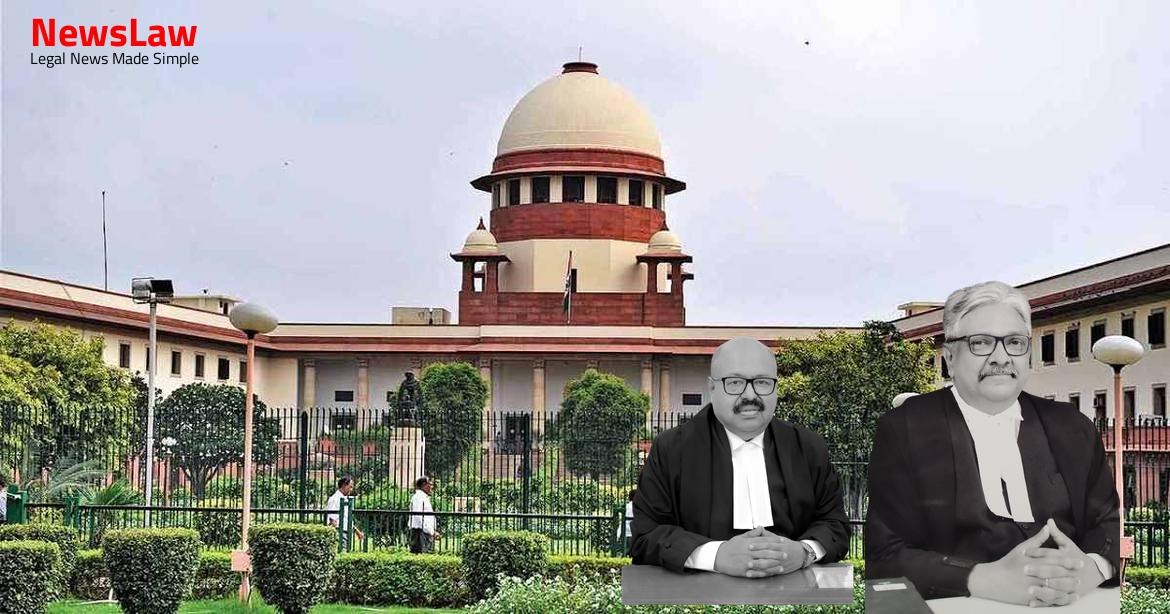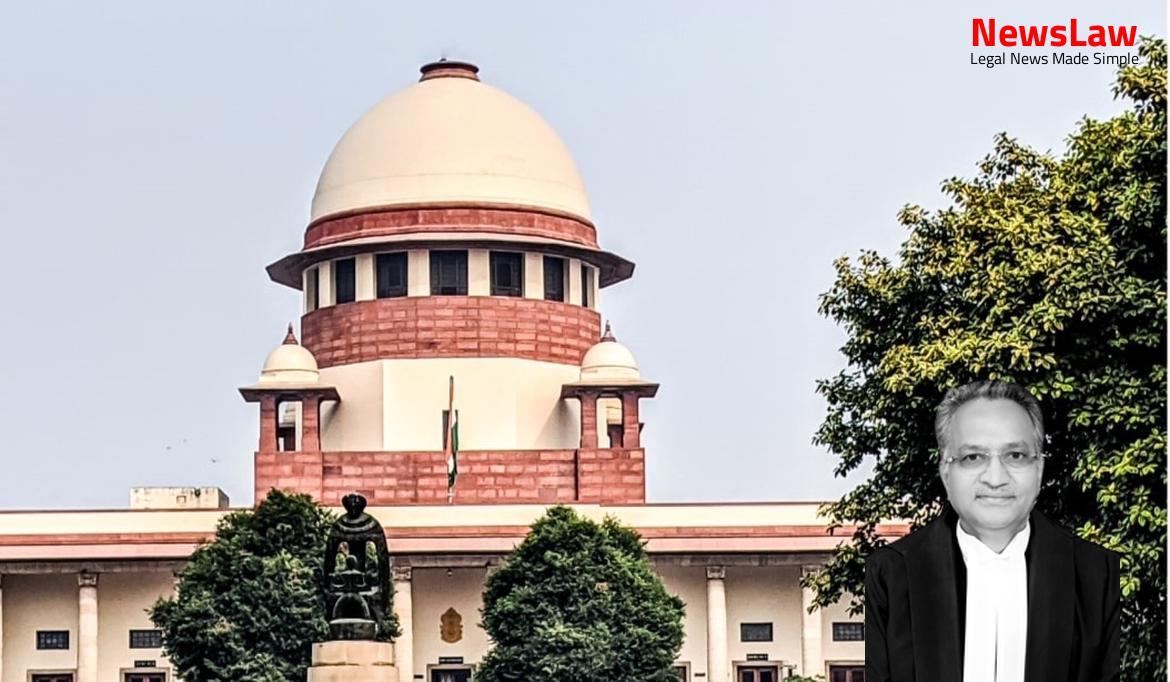The legal analysis of mandatory provisions under the Commercial Courts Act plays a crucial role in shaping the landscape of commercial dispute resolution. In a recent case, the court’s interpretation of whether certain provisions are mandatory or directory sheds light on the procedural intricacies of the law. This blog delves into the implications of the court’s analysis and its impact on the efficiency of resolving commercial disputes.
Facts
- The appellant filed an application on 05.02.2021 under Order VII Rules 10 and 11 read with Sections 9 and 20 of the CPC, alleging non-adherence to Section 12A of the Act in the suit filed by the respondent.
- A written statement was filed on 23.03.2021 in response to the commercial suit filed by the respondent before the Additional District Judge for recovery of a certain sum of money.
- The appellant contested the suit on the grounds of non-compliance with Section 12A of the Act.
- The trial Court rejected the contention of the appellant
- Section 12A outlines a mandatory procedure
- Adherence to the principles of Section 12A is crucial
- Rejection of the plaintiff’s suit could have a catastrophic effect
Also Read: Interpretation of Custody in Contempt of Court Case
Issue
- The key issue in consideration is whether the pre-litigation mediation required under Section 12A of the Commercial Courts Act, 2015 is mandatory.
- It questions whether the lower Courts were correct in rejecting applications under Order VII Rule 11 of the CPC to dismiss the plaints without adhering to the procedure in Section 12A of the Act.
Also Read: Enforcement of Arbitral Award – Court’s Legal Analysis
Arguments
- Arguments presented by the petitioner’s counsel regarding the understanding of Section 12A as directory and discretionary
- Counsel’s distinction between presentation of the plaint and institution of the suit
- Reference to the judgment in Madiraju Venkata Ramana Raju v. Peddireddigari Ramachandra Reddy and Others for support
- Discussion on the relevance of the 2018 amendment incorporating Section 12A in promoting India as a favorable destination for economic activity
- Overview of the plea regarding rejection of plaint under Order VII Rule 11 and the implications on court fees
- Criticism of the High Court’s decision to keep the suit suspended for mediation
- Misinterpretation of the Commercial Courts (Pre-Institution Mediation and Settlement) Rules, 2018 by the High Court
- Mention of the Court’s ability to sua sponte reject a plaint and the importance of substantial compliance with Section 12A
- Comparison with the Bombay High Court Division Bench’s opinion on the mandatory nature of Section 12A
- Emphasis on the legislative intent to de-clog the court system and streamline commercial cases
- Consideration of the word ‘shall’ in statutory provisions to determine mandatory nature
- Explanation of the trial court’s approach and errors in considering post-institution mediation as compliance
- Highlighting the oversight of the plain language and legislative intent in the impugned order
- Parallel drawn between Section 80 CPC and Section 12A to argue for mandatory compliance
- Discussion on the significance of enhancing ease of doing business in India through commercial court procedures
- Clarification on the lack of prejudice if a suit is rejected under Order VII Rule 11 and the option for a fresh suit post-compliance
- Assertion of the mandatory nature of Section 12A based on the use of ‘shall’ and legislative goals
- Observation on the institution of a suit without complying with Section 12A not affecting the defendant’s legal rights
- Reference to conflicting views in different High Courts regarding the mandatory nature of Section 12A
- Citing the absence of penal consequences in Section 12A for instituting a suit without compliance
- Section 12A is intended to bring about a settlement between parties.
- The Court has kept proceedings in the suit in abeyance and referred the parties for mediation.
- Appellant has not participated in the mediation procedure, despite swearing by mediation.
- The plaintiff is obliged to pay the entire court fee as per the law.
- Pre-litigation mediation under Section 12A does not fall within the inherent jurisdiction of a Court.
Also Read: Supreme Court’s Analysis on Advocates On Record System
Analysis
- The analysis focuses on interpreting Section 12A as a mandatory provision within the context of the Commercial Courts Act.
- The discussion includes comparisons with Section 80 of the CPC and Section 69 of the Indian Partnership Act to highlight mandatory provisions.
- The importance of mediation as a new mechanism for dispute resolution is emphasized, especially in commercial matters.
- The need for trained mediators and infrastructural facilities for effective mediation is highlighted.
- The impact of mediation on easing the burden of courts, reducing docket explosion, and expediting commercial dispute resolution is emphasized.
- The distinction between presentation of a plaint and institution of a suit is clarified in relation to Section 12A compliance.
- Prospective overruling, waiver, and substantial compliance in the context of Section 12A are discussed.
- The interpretation of ‘shall’ in Section 12A is viewed as imperative and indicative of a mandatory provision.
- The provision being mandatory or directory depends on the intention of the law-maker as expressed in the law itself.
- If a statute prescribes a particular act to be done in a specific manner and specifies consequences for non-compliance, it is usually considered mandatory.
- The court may grant relief, even if procedural requirements are not strictly followed, to meet the ends of justice.
- Prospective overruling is a mechanism to avoid reopening settled issues and prevent multiplicity of proceedings.
- The terms ‘shall’ and ‘may’ in statutory provisions determine whether the provision is mandatory.
- The purpose of law is to advance justice, and procedural rules should serve justice rather than hinder it.
- Mediation is a mechanism for private, fast, and economical resolution of disputes, promoting democratic decision-making.
- The doctrine of prospective overruling is a recognition that courts must tailor relief to meet the justice of the case.
- The court may deny relief despite holding in favor of the claimant to do ‘complete justice’.
- The power of the court under Article 142 of the Constitution is a transcendent power beyond statutory limitations.
- The Act enacted in 2015 mandates pre-institution mediation for commercial disputes.
- The Authority issues notices for mediation, sets dates for appearance, and assigns mediators.
- If the opposite party fails to appear, the mediation process is treated as a non-starter.
- Settlements reached in mediation have the same status as arbitral awards under the Arbitration and Conciliation Act.
- The Act requires completion of the mediation process within three months, extendable by two months with consent.
- The time spent on pre-litigation mediation does not count towards the period of limitation under the Limitation Act.
- The Act provides rules for initiating the mediation process, application forms, and the role of the Authority in the mediation process.
- The court noted that the issues raised in the present case were different from those in previous cases.
- It was observed that the facts and circumstances of each case need to be considered separately.
- The court emphasized the importance of analyzing the specific facts and legal principles relevant to the case at hand.
- Section 12A of the Act is mandatory for filing a suit
- Suits instituted in violation of Section 12A must be rejected under Order VII Rule 11
- Court has the power to decide on the availability of Section 14
- The power under Section 14 can be exercised by the court suo moto
- Suits violating Section 12A must be rejected unless the law is declared prospective
- In a fresh suit, shelter can be taken under Section 14 of the Limitation Act if otherwise barred by limitation
- If plaints have already been rejected and no steps taken within the limitation period, the matter cannot be reopened
- If the order of rejection of the plaint has been acted upon by filing a fresh suit, the prospective effect declaration will not help the plaintiff
- If the plaint is filed in violation of Section 12A after the High Court has declared it mandatory, the plaintiff will not be entitled to relief
Decision
- Mediator, parties, authorized representatives, and Counsel must maintain confidentiality about the mediation process.
- Declaration of confidentiality effective from 20.08.2022 to inform stakeholders.
- One-time mediation fee to be shared equally based on the quantum of claim as specified in Schedule II.
- Disposal of matters based on the specified quantum of claim ranges.
- Disapproval of reasoning in impugned orders but no interference with orders, appeals stand disposed of accordingly.
- Rule 11 provides for the mediation fee.
Case Title: M/S PATIL AUTOMATION PRIVATE LIMITED Vs. RAKHEJA ENGINEERS PRIVATE LIMITED (2022 INSC 841)
Case Number: C.A. No.-005333-005333 / 2022



